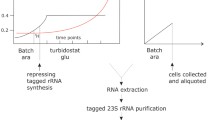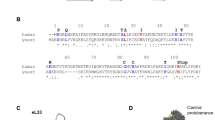Abstract
The Escherichia coli chaperone DnaK is vital for many cellular functions, including ribosome biogenesis at high temperature. Thus, the dnaK756-ts (λ R) mutant, at the non-permissive temperature, is inhibited at a late stage of ribosome assembly, yielding 21S, 32S and 45S precursor particles. This defect, unlike the λ resistance and thermosensitivity phenotypes, is not complemented by lysogenisation with a transducing phage λ dnaK + bearing the wild-type dnaK gene. However this dominant phenotype becomes recessive when dnaK + is expressed from a medium-copy-number plasmid. On the other hand, an excess of DnaK causes an unexpected dominant-lethal effect of the dnaK756 allele near non-permissive temperatures. This interplay between the dnaK +and dnaK756 alleles supports the idea of that DnaK oligomers form in the cell.
Similar content being viewed by others
Author information
Authors and Affiliations
Additional information
Received: 28 April 1998 / Accepted: 24 July 1998
Rights and permissions
About this article
Cite this article
Sbai, M., Alix, JH. DnaK-dependent ribosome biogenesis in Escherichia coli : competition for dominance between the alleles dnaK756 and dnaK + . Mol Gen Genet 260, 199–206 (1998). https://doi.org/10.1007/s004380050886
Issue Date:
DOI: https://doi.org/10.1007/s004380050886




